Pseudocoelomates - Study guides, Class notes & Summaries
Looking for the best study guides, study notes and summaries about Pseudocoelomates? On this page you'll find 22 study documents about Pseudocoelomates.
All 22 results
Sort by
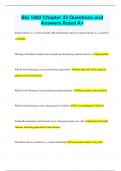
-
Bio 1402 Chapter 33 Questions and Answers Rated A+
- Exam (elaborations) • 8 pages • 2024
-
Available in package deal
-
- $9.99
- + learn more
Bio 1402 Chapter 33 Questions and Answers Rated A+ Schistosomiasis is a serious disorder afflicting humans mainly in tropical regions; it is caused by a fluke. The long, flat bodies of tapeworms are made up of repeating segments known as proglottids. Which of the following is not true about beef tapeworms? more than 10% of the cattle are infected in the United States Which of the following is not true about pseudocoelomates? They contain a bony skeleton. Which of the followin...
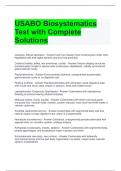
-
USABO Biosystematics Test with Complete Solutions
- Exam (elaborations) • 2 pages • 2024
-
- $12.99
- + learn more
USABO Biosystematics Test with Complete Solutions Calcarea, Silicea (sponges) - Answer-Lack true tissues; have choanocytes (collar cells-flagellated cells that ingest bacteria and tiny food particles) Cnidaria (hydras, jellies, sea anemones, corals) - Answer-Unique stinging structures (nematocysts) housed in special cells (cnidocytes); diploblastic, radially symmetrical, gastrovascular cavity Plathyhelminthes - Answer-Dorsoventrally flattened, unsegmented acoelomates; gastrovascular cavit...
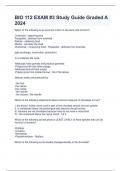
-
BIO 112 EXAM #3 Study Guide Graded A 2024
- Exam (elaborations) • 8 pages • 2024
-
- $11.49
- + learn more
Which of the following is an incorrect match of structure and function? Cnidocyte - capturing prey Parapodia - defense from enemies Radula - obtaining food Mantle - secretes the shell Chelicerae - consuming food - Parapodia - defense from enemies (gas exchange, locomotion, protection) In a cnidarian life cycle, -Medusae have gonads and produce gametes -Polyps bud off from other polyps -Medusae bud off from polyps -Polyps grow from ciliated larvae - All of the above ...
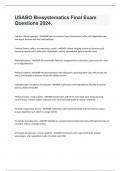
-
USABO Biosystematics Final Exam Questions 2024.
- Exam (elaborations) • 3 pages • 2024
-
Available in package deal
-
- $12.49
- + learn more
USABO Biosystematics Final Exam Questions 2024. Calcarea, Silicea (sponges) - ANSWER Lack true tissues; have choanocytes (collar cells-flagellated cells that ingest bacteria and tiny food particles) Cnidaria (hydras, jellies, sea anemones, corals) - ANSWER Unique stinging structures (nematocysts) housed in special cells (cnidocytes); diploblastic, radially symmetrical, gastrovascular cavity Plathyhelminthes - ANSWER Dorsoventrally flattened, unsegmented acoelomates; gastrovascular cavity ...
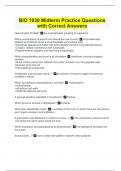
-
BIO 1030 Midterm Practice Questions with Correct Answers
- Exam (elaborations) • 5 pages • 2024
-
Available in package deal
-
- $8.99
- + learn more
Heterotrophic Protists? Are a paraphyletic grouping of organisms Which combinations of phylum and description are correct? -Echinodermata: bilateral symmetrical larvae and pentaradially symmetrical adult -Nematoda: pseudocoelomates with both parasitic and free living representatives -Cnidaria: radially symmetrical with cnidocytes -Platyhelminthes: parasitic and free-living acoelomates Which characteristics are found in all chordates: -notochord: structural support, skeleton, -dorsal, hollow ne...
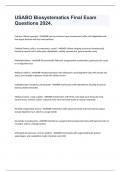
-
USABO Biosystematics Final Exam Questions With Correct Answers 2024.
- Exam (elaborations) • 3 pages • 2024
-
Available in package deal
-
- $10.49
- + learn more
USABO Biosystematics Final Exam Questions With Correct Answers 2024. Calcarea, Silicea (sponges) - ANSWER Lack true tissues; have choanocytes (collar cells-flagellated cells that ingest bacteria and tiny food particles) Cnidaria (hydras, jellies, sea anemones, corals) - ANSWER Unique stinging structures (nematocysts) housed in special cells (cnidocytes); diploblastic, radially symmetrical, gastrovascular cavity Plathyhelminthes - ANSWER Dorsoventrally flattened, unsegmented acoelomates; ...

-
BIO 315 Key Predicted Exam Questions And Correct Answers
- Exam (elaborations) • 17 pages • 2024
-
- $7.99
- + learn more
How does the Who map indicate that helminthic diseases are associated with poverty? The areas that have higher prevalence of disease are areas of tribal lands and poor rural areas, which can therefore be in association with poverty. How common are nematodes? Nematodes are very common, they are the most numerous multicellular animals on earth. What is meant by a tube within a tube structure for these organisms? The tube-within-a tube structure is a way to describe the nematode body stru...
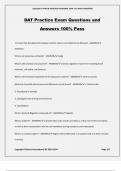
-
DAT Practice Exam Questions and Answers 100% Pass
- Exam (elaborations) • 6 pages • 2024
-
- $11.49
- + learn more
DAT Practice Exam Questions and Answers 100% Pass If a toxin that disrupted microtubule function, what is most likely to be affected? - ANSWER- Anaphase Where are lysosomes produced? - ANSWER-Golgi What is the function of a lysosome? - ANSWER-Contains digestive enzymes for breaking down nutrients, cell debris, and bacteria What is the functional equivalent of the lysosome in plants? - ANSWER-Central vacuole What are 4 possible places were microfilaments can be found? - ANSWER-1. Muscle c...

-
DAT Questions from Practice Exams Solution And Answer.
- Exam (elaborations) • 5 pages • 2024
-
- $12.99
- + learn more
If a toxin that disrupted microtubule function, what is most likely to be affected? - correct answer Anaphase Where are lysosomes produced? - correct answer Golgi What is the function of a lysosome? - correct answer Contains digestive enzymes for breaking down nutrients, cell debris, and bacteria What is the functional equivalent of the lysosome in plants? - correct answer Central vacuole What are 4 possible places were microfilaments can be found? - correct answer 1. Muscle cells 2...
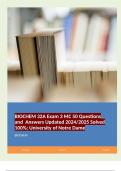
-
BIOCHEM 32A Exam 3 MC 50 Questions and Answers Updated 2024/2025 Solved 100%; University of Notre Dame
- Exam (elaborations) • 11 pages • 2024
-
- $15.49
- + learn more
BIOCHEM 32A Exam 3 MC 50 Questions and Answers Updated 2024/2025 Solved 100%; University of Notre Dame 1. Nearly all animals are eukaryotes that undergo a stage where they are sexually immature and morphologically distinct from the adult stage. a. Heterotrophic : Larval b. Multicellular : Juvenile c. Autotrophic : Larval d. Multicellular : Autotrophic 2. During development, animals undergo a stage where they are comprised of a hollow, multicellular sphere of cells. a. Gastrula ...

That summary you just bought made someone very happy. Also get paid weekly? Sell your study resources on Stuvia! Discover all about earning on Stuvia


